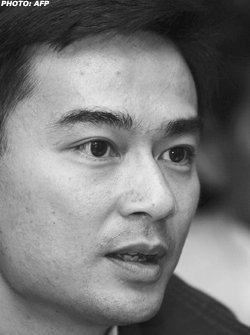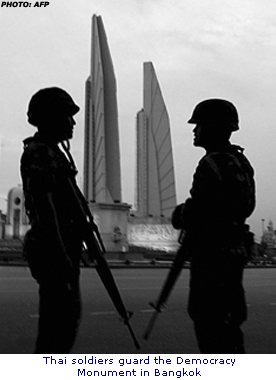
| By ABHISIT VEJJAJIVA | Tuesday, April 3, 2007 |
Democrat Party leader Abhisit Vejjajiva speaks to The Irrawaddy about the state of Thailand’s political health and the future of democracy in the kingdom
Question: Given its limited time frame, what are the key issues and challenges the current interim government faces?
Answer: I think the government faces very tough challenges. The confidence and the popularity of the government have steadily declined over the last few months. If this trend continues, the people will become very frustrated. If they feel there is no hope on the horizon in terms of a return to a better democracy, we could see real tension and possible confrontation. 
So, the immediate challenge is for the government to regain some confidence. I think Prime Minister Surayud Chulanont missed a golden opportunity in the Cabinet reshuffle in March by not making a major change to the line-up, to give a sense of freshness.
At the same time, both the government and the CNS [Council for National Security] have to be much clearer on their stance concerning a new constitution. I think the one factor that could create a new crisis is if the new constitution is viewed as a way of letting these people hang on to power beyond the election. Any move in that direction should be stopped immediately.
Q: What are the risks to the future of Thailand’s democracy if the forthcoming charter referendum is politicized in this way?
A: Well, according to the provisional constitution, if the charter is rejected in the public referendum, power goes back to the hands of the CNS and the Cabinet to choose a constitution and make any necessary amendments to create the next constitution. Now, clearly, if the CNS and the Cabinet do not make their stance clear, it could render the referendum meaningless, because people would not really be aware of their choices before they go to vote.
So I’ve been calling on them to make clear what they would do should that situation arise. The people need to know before they vote. And clearly if the CNS and Cabinet announce, for instance, that they would take the 1997 Constitution and only make some minor revisions concerning independent organizations, then the choices would be clearer. The public would know that if the proposed charter is rejected, there would still be a democratic constitution [to fall back to].
Q: Regarding political tensions and activities by certain political groups over the next few months, do you feel they pose a serious threat?
A: I think it will continue to be a threat for a number of reasons. First, I don’t think that Thaksin and his people will give up. They will mount challenges wherever they can. In the TITV (Thailand Indepdenent TV) case, it showed that it is quite easy to mobilize people if they are dissatisfied with what the CNS or government does.
Second, if popularity and confidence in the government continues to decline, then comparisons inevitably will be made with the Thaksin [Shinawatra] regime. That’s why it’s important for the CNS and the Cabinet to shore up public confidence by creating a sense of purpose and by explaining what they are doing to the people.
Q: From the point of view of the Democrats, what is the party’s strategy looking forward to elections in December?
A: We’re certainly going ahead with policy preparations. But all of this has to be internal. We are also restricted by two things. First, there is the CNS order banning political activity by political parties. Second, we still have a court case to fight [in the electoral fraud case against the Democrat and Progressive Democratic parties].
Q: Do you think Thailand can work through the challenges it faces relatively unscathed, or are we in for dangerous times ahead?
A: It’s certainly possible. All that needs to happen is that the people who now have power recognize that the most immediate need is to return the country to democracy and democratic principles. If they stick to that, I think Thailand will do just fine.